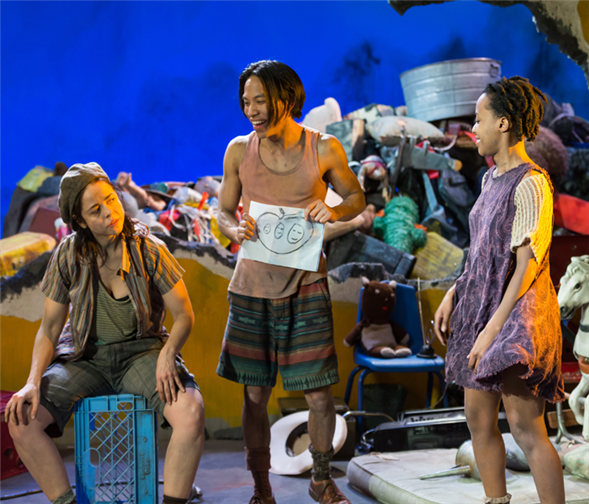Translate Page

A new play skewers the selfishly charitable
---
In Phillip Howze's hilarious, heart-wrenching, and sometimes scabrous Frontiéres Sans Frontières, playing through Mar 25 at the Bushwick Starr, three stateless kids take center stage. They speak a creatively styled English that tickles the listener's ear and could only be uttered by those for whom English is a second language. The plucky trio live, dance, and make mischief in a garbage heap, where they encounter a number of well-intentioned adult buffoons who try to "improve the lot" of the youngsters.
For Howze, plays often begin with a jarring image, and Frontiéres Sans Frontières was no exception. "I had an image in mind of a group of young people living on a garbage heap and smiling," he says. From there he tried "to write into the incongruity. The question for this play is: What does it mean to be born and raised and living in such a place, but with joy and savvy and the desire to thrive? I try to write into that and understand what that means."
In an earlier chapter of his life, Howze worked in the human rights world for the Open Society Foundations. "For me, if a play's not personal then it's not risking something, and the vulnerability isn't there," he says. Yet Frontiéres Sans Frontières doesn't exactly feel like a documentary. "It's a deliberate choice to set the play in a non-specific, specific place," he continues. "I prefer that. Such a play provides an openness for the audience to imagine. By not naming the place, the play can activate different memories for different audience members and that's important to me."
{Image1}
So when a character utters the Gertrude Stein-ian observation that "here is here," "here" might mean "a theatre in Bushwick" for one listener and, say, the edge of Syria for another. Meanwhile, Howze's off-kilter language, delivered in accents that bounce among Swedish and Russian and many cadences in between, creates an infections energy. "I wrote this play from a place of pure and utter delight, because I knew there was a reason the young people were smiling in that image," he says.
Despite, or perhaps because of, its comedic tone, Frontiéres Sans Frontières also manages to deeply unsettle. The adult characters who pass through the garbage heap create an arch parade of poverty tourism, and they have the satirical sting of the uncomfortable truth.
"The darkness of this story requires a kind of lightness," says Howze. "We see the central characters and the peripheral characters make choices and we see them fail. The people who enter this porous world" – including a doctor, a clown, and a celebrity actor – "are unqualified and incapable of doing the work they say they are doing. It is both grotesque and very truthful. I am not trying to implicate or tell people to go do different work. Rather that this is one aspect of the characters we see parading through such a place."
{Image2}
Casting is particularly important to making this material work. "We knew we wanted to work with actors of color," says Howze. "There is a personal stake in this for the cast, whether it's the political situation or whether it's the desire to just be funny on stage."
That funniness also makes room for the show's final moment, which Howze calls "the height of strangeness." An autocratic "Nobel Laureate," embodied by an actor whose character has died, floats above the stage. "There is something about the populism of what she says that is sinister," says Howze. "There's talk of mobile phones and giving away free cars and making it rain free money, and it's the voice of a dictator. It's certainly the voice of the leader we have right now."
---
Writer and performer Eliza Bent frequently contributes to TDF Stages.
TDF MEMBERS: Go here to browse our current discounts for theatre, dance, and concerts.
Photos of the production by Joey Moro. Photo of Phillip Howze by Zach DeZon. Top photo: A scene from Frontiéres Sans Frontières.